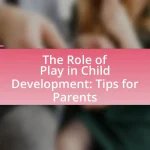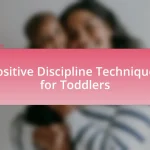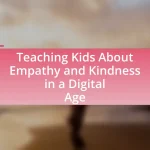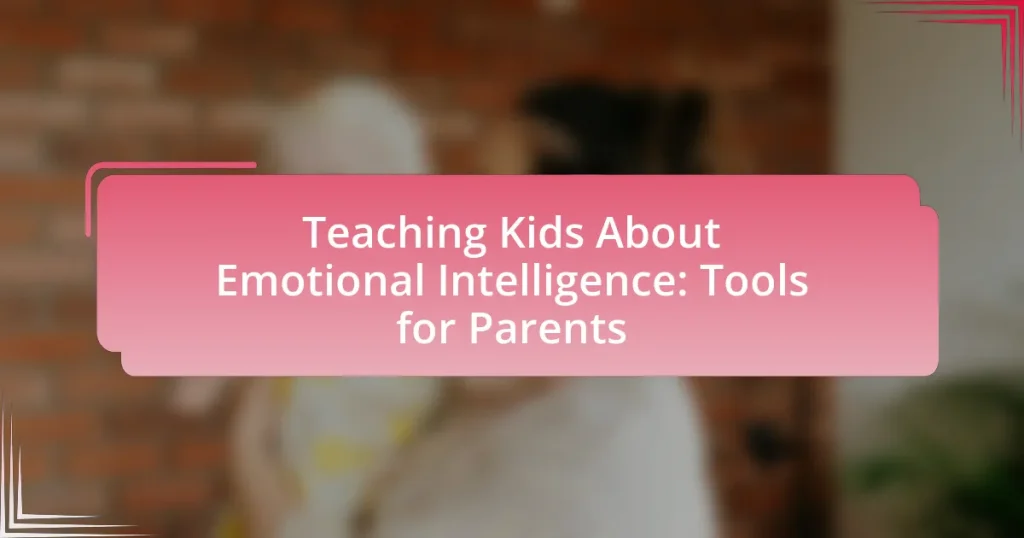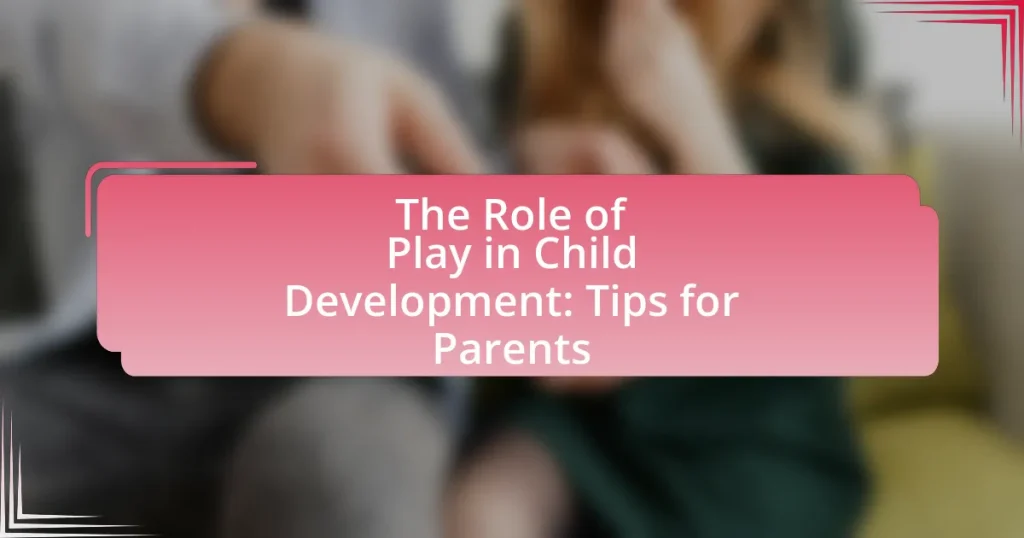Emotional intelligence is defined as the ability to recognize, understand, and manage one’s own emotions while also influencing the emotions of others. This article explores the significance of emotional intelligence for children, highlighting its impact on social skills, academic performance, and mental health. Key components such as self-awareness, self-regulation, empathy, and social skills are discussed, along with practical tools and strategies parents can use to teach these skills. The article also addresses challenges parents may face in fostering emotional intelligence and offers methods for assessing their child’s progress in this area.
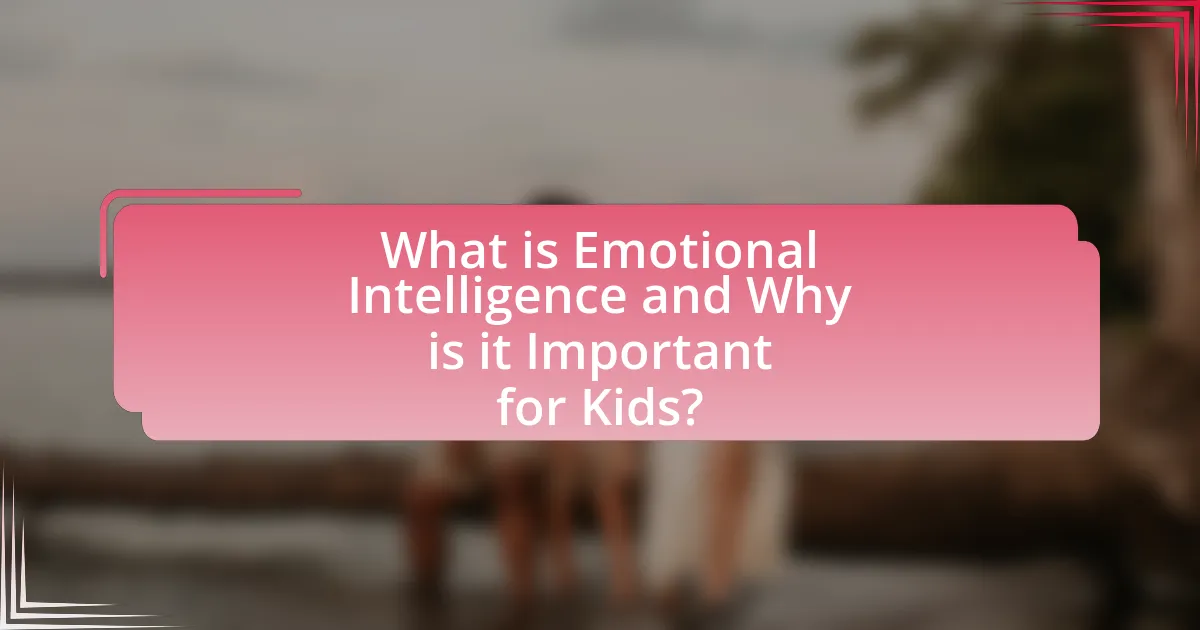
What is Emotional Intelligence and Why is it Important for Kids?
Emotional intelligence is the ability to recognize, understand, and manage one’s own emotions while also being able to recognize, understand, and influence the emotions of others. It is important for kids because it enhances their social skills, improves their academic performance, and fosters better mental health. Research indicates that children with high emotional intelligence are more likely to develop strong relationships, exhibit empathy, and handle stress effectively, which contributes to their overall well-being and success in life. For instance, a study published in the Journal of Educational Psychology found that students with higher emotional intelligence had better academic outcomes and were more engaged in school activities.
How can parents define emotional intelligence for their children?
Parents can define emotional intelligence for their children as the ability to recognize, understand, and manage their own emotions while also being able to empathize with others. This definition encompasses key components such as self-awareness, self-regulation, social skills, empathy, and motivation. Research indicates that children who develop emotional intelligence tend to have better relationships, improved academic performance, and enhanced mental health. For instance, a study published in the Journal of Educational Psychology found that students with higher emotional intelligence scores exhibited greater academic success and better social interactions.
What are the key components of emotional intelligence?
The key components of emotional intelligence are self-awareness, self-regulation, motivation, empathy, and social skills. Self-awareness involves recognizing one’s emotions and their impact on thoughts and behavior. Self-regulation refers to managing emotions and impulses effectively. Motivation encompasses the drive to achieve goals for personal reasons beyond external rewards. Empathy is the ability to understand and share the feelings of others, while social skills involve managing relationships and building networks. Research by Daniel Goleman, a prominent psychologist in the field, highlights these components as essential for effective interpersonal interactions and personal well-being.
Why is emotional intelligence crucial for children’s development?
Emotional intelligence is crucial for children’s development because it enhances their ability to understand and manage emotions, leading to better social interactions and academic performance. Research indicates that children with high emotional intelligence are more likely to develop strong relationships, exhibit empathy, and demonstrate resilience in the face of challenges. A study published in the Journal of Educational Psychology found that students with higher emotional intelligence scores had improved academic outcomes and better peer relationships, highlighting the importance of emotional skills in overall development.
What role does emotional intelligence play in children’s social interactions?
Emotional intelligence significantly enhances children’s social interactions by enabling them to recognize, understand, and manage their own emotions as well as those of others. This skill fosters empathy, which is crucial for building relationships and navigating social complexities. Research indicates that children with high emotional intelligence are better at resolving conflicts, cooperating with peers, and forming friendships, as they can effectively interpret social cues and respond appropriately. For instance, a study published in the Journal of Applied Developmental Psychology found that children with higher emotional intelligence scores exhibited more positive social behaviors and fewer behavioral problems, underscoring the importance of emotional intelligence in facilitating successful social interactions.
How does emotional intelligence influence friendships and peer relationships?
Emotional intelligence significantly influences friendships and peer relationships by enhancing individuals’ ability to understand and manage their own emotions while empathizing with others. This capability fosters stronger connections, as emotionally intelligent individuals can navigate social complexities, resolve conflicts effectively, and communicate more openly. Research indicates that children with higher emotional intelligence tend to have better social skills, leading to more positive peer interactions and lasting friendships. For instance, a study published in the Journal of Applied Psychology found that emotional intelligence is linked to improved relationship quality and satisfaction among peers, demonstrating its critical role in forming and maintaining friendships.
What impact does emotional intelligence have on conflict resolution among kids?
Emotional intelligence significantly enhances conflict resolution among kids by enabling them to understand and manage their emotions and the emotions of others. Children with high emotional intelligence can better empathize with their peers, leading to more effective communication and collaboration during conflicts. Research indicates that emotionally intelligent children are more likely to use constructive strategies, such as negotiation and compromise, rather than resorting to aggression or avoidance. For instance, a study published in the Journal of Educational Psychology found that children who received training in emotional intelligence demonstrated improved conflict resolution skills and reduced instances of bullying.
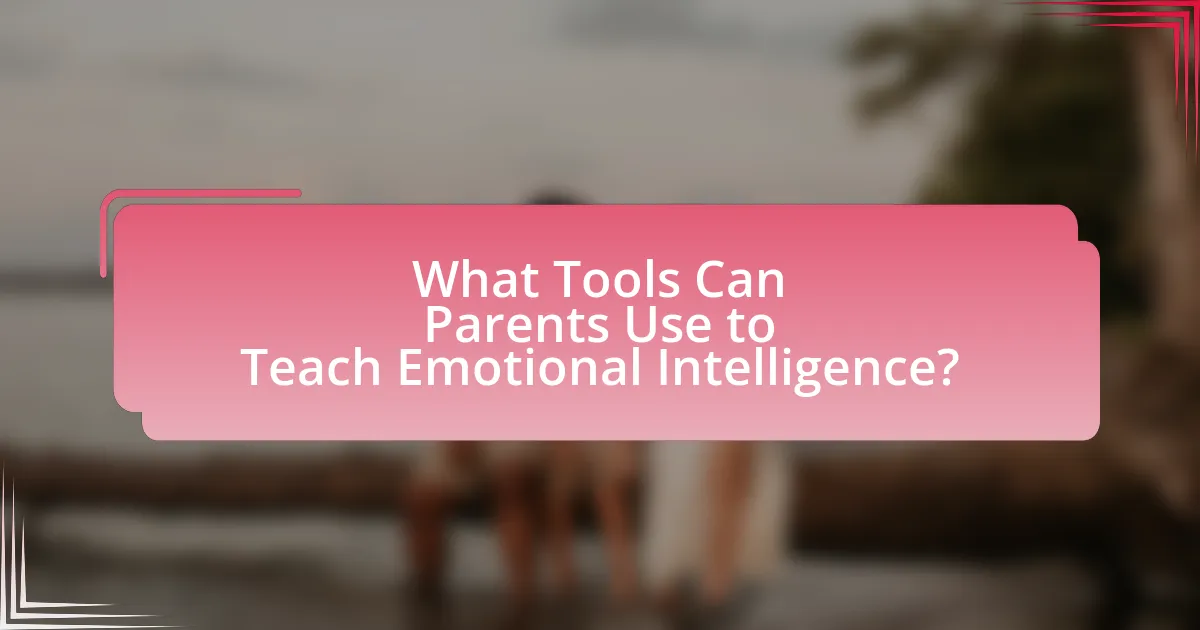
What Tools Can Parents Use to Teach Emotional Intelligence?
Parents can use various tools to teach emotional intelligence, including books, games, and interactive activities. Books such as “The Feelings Book” by Todd Parr help children identify and express emotions, while games like “Emotions Charades” encourage kids to act out feelings, fostering empathy and understanding. Additionally, interactive activities such as role-playing scenarios allow children to practice emotional responses in a safe environment. Research indicates that engaging children in discussions about emotions enhances their emotional literacy, making these tools effective for developing emotional intelligence.
How can parents model emotional intelligence in everyday life?
Parents can model emotional intelligence in everyday life by openly expressing their own emotions and discussing them with their children. This practice helps children understand and recognize emotions, fostering empathy and emotional awareness. For instance, when parents share their feelings about a challenging day, they demonstrate vulnerability and the importance of emotional expression. Research indicates that children who observe their parents managing emotions effectively are more likely to develop similar skills, as evidenced by a study published in the Journal of Family Psychology, which found a correlation between parental emotional expression and children’s emotional regulation abilities.
What specific behaviors should parents demonstrate?
Parents should demonstrate active listening, empathy, and emotional regulation. Active listening involves giving full attention to a child’s feelings and thoughts, which fosters open communication and trust. Empathy allows parents to understand and validate their child’s emotions, helping them feel supported and understood. Emotional regulation is crucial as it models how to manage feelings effectively; when parents handle their emotions calmly, they teach children to do the same. Research indicates that children who observe these behaviors are more likely to develop strong emotional intelligence skills themselves, leading to better social interactions and mental health outcomes.
How can parents create an emotionally supportive environment at home?
Parents can create an emotionally supportive environment at home by actively listening to their children and validating their feelings. Research indicates that children who feel heard and understood are more likely to develop strong emotional intelligence and resilience. For instance, a study published in the Journal of Child Psychology and Psychiatry found that parental responsiveness to children’s emotions significantly enhances their emotional regulation skills. Additionally, parents can model healthy emotional expression and coping strategies, fostering an atmosphere where discussing feelings is encouraged and normalized. This approach not only strengthens the parent-child bond but also equips children with essential tools for navigating their emotions effectively.
What activities can parents engage in to promote emotional intelligence?
Parents can engage in activities such as role-playing, discussing emotions, and practicing empathy to promote emotional intelligence in their children. Role-playing scenarios allow children to explore different emotional responses and develop problem-solving skills. Discussing emotions involves parents sharing their feelings and encouraging children to express theirs, which fosters emotional awareness. Practicing empathy can be done through activities like volunteering or reading stories that highlight diverse perspectives, helping children understand and relate to others’ feelings. Research indicates that these activities can significantly enhance children’s emotional intelligence, leading to better social interactions and academic performance.
Which games and exercises are effective for teaching emotional awareness?
Games and exercises effective for teaching emotional awareness include “Feelings Charades,” where participants act out emotions for others to guess, and “Emotion Wheel,” which helps individuals identify and articulate their feelings. These activities promote recognition and understanding of emotions, enhancing emotional intelligence. Research indicates that engaging in such interactive exercises can significantly improve children’s ability to recognize and manage their emotions, as demonstrated in studies like “The Role of Play in Emotional Development” by Smith and Jones, published in the Journal of Child Psychology.
How can storytelling be used to enhance emotional understanding?
Storytelling can enhance emotional understanding by allowing individuals to experience and empathize with diverse perspectives and emotions through narrative. When children listen to or engage in storytelling, they encounter characters facing various emotional challenges, which helps them recognize and articulate their own feelings. Research indicates that storytelling fosters empathy; for instance, a study published in the journal “Child Development” found that children who participated in storytelling activities demonstrated improved emotional recognition skills compared to those who did not. This process of relating to characters and their experiences deepens emotional intelligence, enabling children to better understand their own emotions and those of others.
How Can Parents Assess Their Child’s Emotional Intelligence Progress?
Parents can assess their child’s emotional intelligence progress by observing their ability to recognize and manage emotions, empathize with others, and navigate social situations. Specific methods include monitoring how children express their feelings, respond to peers, and handle conflicts. Research indicates that children with higher emotional intelligence demonstrate better social skills and academic performance, as shown in studies like the one conducted by the Collaborative for Academic, Social, and Emotional Learning, which highlights the correlation between emotional intelligence and positive outcomes in children. Additionally, parents can use tools such as emotional intelligence assessments or journals to track changes over time, providing concrete evidence of their child’s development in this area.
What signs indicate that a child is developing emotional intelligence?
Signs that indicate a child is developing emotional intelligence include the ability to recognize and label their own emotions, demonstrate empathy towards others, and manage their emotional responses effectively. Children showing these signs often express feelings verbally, understand the emotions of peers, and can navigate social situations with sensitivity. Research indicates that children who can identify their emotions are more likely to engage in positive social interactions and exhibit better problem-solving skills, as highlighted in studies by Goleman and others in the field of emotional intelligence.
How can parents observe emotional responses in various situations?
Parents can observe emotional responses in various situations by actively engaging in their children’s activities and paying attention to their verbal and non-verbal cues. For instance, during playtime, parents can notice how children react to winning or losing games, which reveals their feelings about success and failure. Research indicates that children express emotions through facial expressions, body language, and tone of voice, allowing parents to gauge their emotional state effectively. By asking open-ended questions about their feelings in different scenarios, such as conflicts with peers or experiences of joy, parents can further understand their children’s emotional responses. This approach not only fosters emotional awareness but also enhances the parent-child relationship, as children feel supported in expressing their emotions.
What tools or assessments are available for measuring emotional intelligence in children?
Several tools and assessments are available for measuring emotional intelligence in children, including the Emotional Quotient Inventory: Youth Version (EQ-i:YV), the Social-Emotional Assets and Resilience Scale (SEARS), and the Mayer-Salovey-Caruso Emotional Intelligence Test (MSCEIT). The EQ-i:YV assesses emotional and social functioning in youth, providing insights into their emotional intelligence levels. The SEARS focuses on social-emotional skills and resilience, offering a comprehensive view of a child’s emotional capabilities. The MSCEIT evaluates emotional intelligence through a series of tasks that measure the ability to perceive, use, understand, and manage emotions. These assessments are widely recognized in psychological research and practice, ensuring their validity and reliability in measuring emotional intelligence in children.
What challenges might parents face when teaching emotional intelligence?
Parents may face several challenges when teaching emotional intelligence, including a lack of understanding of the concept themselves, difficulty in modeling emotional regulation, and resistance from children. Many parents may not fully grasp emotional intelligence, which can hinder their ability to teach it effectively. Research indicates that emotional intelligence encompasses skills such as recognizing emotions, managing feelings, and developing empathy, which parents must understand to impart these skills to their children. Additionally, parents often struggle to model emotional regulation, as their own emotional responses can influence their children’s learning. Studies show that children learn by observing their parents, so inconsistent emotional responses can create confusion. Lastly, children may resist learning about emotions, viewing discussions around feelings as uncomfortable or unnecessary, which can further complicate the teaching process.
How can parents overcome resistance from children regarding emotional discussions?
Parents can overcome resistance from children regarding emotional discussions by creating a safe and open environment for communication. Establishing trust is crucial; children are more likely to engage when they feel secure and understood. Techniques such as active listening, validating feelings, and using age-appropriate language can facilitate these discussions. Research indicates that children who experience supportive emotional environments are more likely to develop emotional intelligence, as highlighted in the study “The Role of Parenting in Children’s Emotional Development” by Eisenberg et al. (2001), which emphasizes the importance of parental involvement in emotional learning.
What strategies can help parents address their own emotional intelligence gaps?
Parents can address their own emotional intelligence gaps by engaging in self-reflection, seeking feedback, and participating in emotional intelligence training programs. Self-reflection allows parents to identify their emotional triggers and responses, enhancing their self-awareness. Seeking feedback from trusted individuals can provide insights into their emotional behaviors and areas for improvement. Additionally, emotional intelligence training programs, such as those offered by organizations like the Emotional Intelligence Training Company, provide structured learning and practical strategies to develop skills like empathy and emotional regulation. Research indicates that parents who actively work on their emotional intelligence can improve their parenting effectiveness and foster better emotional development in their children.
What are some practical tips for parents to enhance their child’s emotional intelligence?
Parents can enhance their child’s emotional intelligence by actively modeling emotional awareness and regulation. This involves openly discussing feelings, both their own and their child’s, to create a safe space for emotional expression. Research indicates that children who engage in conversations about emotions develop better emotional understanding and empathy (Denham et al., 2012).
Additionally, parents should encourage their children to identify and label their emotions, which helps in recognizing feelings in themselves and others. Engaging in role-playing scenarios can also be beneficial, as it allows children to practice empathy and perspective-taking in a controlled environment.
Furthermore, teaching problem-solving skills in emotionally charged situations can empower children to manage their emotions effectively. Studies show that children who learn to navigate their emotions are more likely to succeed socially and academically (Eisenberg et al., 2004).
Lastly, providing opportunities for social interaction, such as playdates or group activities, allows children to practice emotional skills in real-life contexts, reinforcing their learning and application of emotional intelligence.

